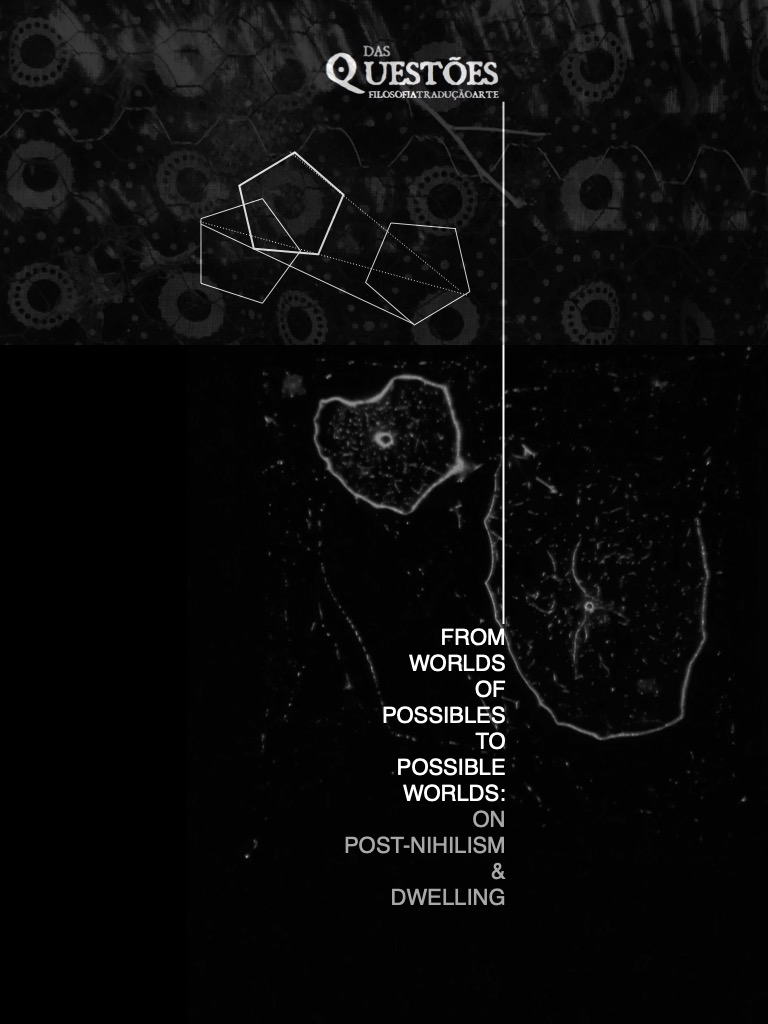The Cosmopolitical Applications of the “Spiritual” in Animist Cultures and their relevance to the environmental humanities today
DOI:
https://doi.org/10.26512/dasquestoes.v13i1.41337Palabras clave:
spirituality and the Anthropocene;, spirituality and environmental humanities;, the spiritual and cosmopolitics;, Bruno Latour;, animist being-in-the-world;, animism and technologyResumen
Through a critical reading of Bruno Latour’s "cosmopolitics“ this paper maintains that the "animist" acceptation of the “the spiritual” can be repurposed into a valuable mediating resource between humankind and the beleaguered planet we live upon. By adopting a “consequentialist standpoint” it assesses the “instrumental value” of the spiritual as a means to foster improved Man-Nature relations. In this assessment I focus on the way “animist cultures” tend to regard the natural environment as sentient and "besouled“ and the way this inclines them to avoid abusing their fellow creatures. I also conside r how they interacted with their environment for productivistic and consumeristic purposes while simultaneously venerating it. Finally, I show how animists submit both humankind and its non human Other to a "cosmodicy“ which constrains both to relate to and interact with one other on an “I Thou” basis, thereby facilitating dialogue and an "entente cordiale" between humanity and nature.
Descargas
Citas
BENNETT, Fionn. Artefactualising the Sacred: Restating the Case for Martin Heidegger's ‘ 'Hermeneutical' Philosophy of Technology. In: DEANE-DRUMMOND, C. (Org.). Technofutures, Nature, and the Sacred: Transdisciplinary Perspectives. Farnham Surrey (UK) Ashgate, 2015. p. 47-65.
BENNETT, Fionn. “Post-Rational Eco-Communicological Aporias, Pre-Rational Eco-Communicological Euporias: The “Magical Worldview” and Restoring a Meaningful Man-Nature Dialogue.” Marburg Journal of Religion v. 22, n. 2 (2020), p. 1-35.
BIRD-DAVID, Nurit. The Giving Environment: Another Perspective on the Economic System of Gatherer Hunters. Current Anthropology v. 31, n. 2 (1990), p. 189-196.
BIRD-DAVID, Nurit. "Animism“ revisited: personhood, environment, and relational epistemology. Current Anthropology, v. 40, n. 1 (1990), pp. S67-S91.
BOILES, Charles. Les chants instrumentaux des Tepehuas un exemple de transmission musicale de significations, Musique en Jeu Autour de Lévi Strauss v. 12 (1999) p. 81-99.
DELEUZE, Gilles, and GUATTARI, Félix. Qu’est ce que la philosophie? Paris: Minuit, 1991.
DESCOLA, Philippe. Par delà nature et culture Paris: Gallimard, 2006.
DIAMOND, Jared. Collapse: How Societies Choose to Fail or Succeed London and New York: Penguin, 2005.
FELD, Steven. Sound an d Sentiment: Birds, Weeping, Poetics, and Song in Kaluli Expression. Philadelphia: University of Pennsylvania Press, 1982.
FOUCAULT, Michel. Les mots et les choses Paris: Gallimard, 1966.
GEERTZ, Clifford. The Interpretation of Cultures New York: Basic Books, 2000.
HAMILTON, Clive. The Theodicy of the “Good Anthropocene.” Environmental Humanities v. 7, n.
(2016), p. 233-238.
HARVEY, Graham. Animism: Respecting the Living World New York: Columbia University Press, 2006.
HARVEY, Graham (ed.) The Handbo ok of Contemporary Animism London: Acumen, 2013.
KLINK, WILLIAM H. Nature, Theology, and Technology. Zygon Journal of Science and Religion v. 27, n. 2, 203-210.
LATOUR, Bruno. Politiques de la nature Paris: La Découverte, 1999.
LATOUR, Bruno. Why Has Critique Run Out of Steam? From Matters of Fact to Matters of Concern. Critical Inquiry v. 30, n. 2 (2004), p. 225-248.
LATOUR, Bruno. An Attempt at a “Compositionist Manifesto.” New Literary History v. 41, n. 3 (2010), p. 471-490.
LATOUR, Bruno. Perspectivism: 'Type‘ or 'Bomb‘. Anthropology Today, v. 25, n. 2 (2009), p. 1-2.
LATOUR, Bruno. Love Your Monsters: Why We Must Care for Our Technologies As We Do Our Children. Breakthrough Journal n. 2 (2011) Online: https://thebreakthrough.org/journal/issue-2/love-your-monsters. Accessed 09/08/2021.
LATOUR, Bruno. Facing Gaia: Eight Lectures on the New Climatic Regime. Translated by Catherine Porter. Cambridge and Malden (MA) Polity Press, 2017.
LEVI STRAUSS, Claude. Mythologiques, v. 1: Le Cru et le Cuit Paris: Plon, 1964.
MCANANY, Patricia A., and Norman YOFFEE. Questioning Collapse: Human Resilience, Ecological Vulnerability, and the Aftermath of Empire Cambridge and New York: Cambridge University Press, 2010.
NIEMAN, Susan. Evil in Modern Thought: An Alternative History of Philosophy Princeton: Princeton University Press, 2002.
SCHNEIDER, Marius. Le rôle de la musique dans la mythologie et les rites des civilisations non Européennes. In: Rolland Manuel (Org.) Histoire de la musique I Paris: Gallimard, 1960, p. 131-214.
SEPIE, Amba. More than Stories, More than Myths: Animal/Human/Nature(s) in Traditional Ecological Worldviews. Humanities v. 6, n. 4 (2017) p. 1-31.
SPIVAK, Gayatri Chakravorty, Can the Subaltern Speak?: Reflections on the History of an Idea
Edited by Rosalind Morris, Columbia University Press, 2010.
STEFFEN, Will, W. BROADGATE, L. DEUTSCH, O. GAFFNEY and G. C. LUDWIG. “The trajectory of the Anthropocene: The Great Acceleration.” The Anthropocene Review v. 2, n. 1 (2015), p. 81-98.
VERNANT, Jean Pierre. Mythe et pensée chez les grecs Paris: La Découverte, 1996.
VIVEIROS, DE CASTRO, Eduardo. Cosmological Deixis and Amerindian Perspectivism. The Journal of the Royal Anthropological Institute v. 4, n. 3 (1-998), pp. 469-488.
VIVEIROS DE CASTRO, Eduardo. Cosmological Perspectivism in Amazonia and Elsewhere. Volume 1 of HAU Masterclass series HAU Journal of Ethnographic Theory 2012
Descargas
Publicado
Cómo citar
Número
Sección
Licencia
Derechos de autor 2021 Das Questões

Esta obra está bajo una licencia internacional Creative Commons Atribución-NoComercial 4.0.
Autores que publicam nesta revista concordam com os seguintes termos:
Autores mantém os direitos autorais e concedem à revista o direito de primeira publicação, sendo o trabalho simultaneamente licenciado sob a Creative Commons Attribution License o que permite o compartilhamento do trabalho com reconhecimento da autoria do trabalho e publicação inicial nesta revista.
Autores têm autorização para assumir contratos adicionais separadamente, para distribuição não-exclusiva da versão do trabalho publicada nesta revista (ex.: publicar em repositório institucional ou como capítulo de livro), com reconhecimento de autoria e publicação inicial nesta revista.
Autores têm permissão e são estimulados a publicar e distribuir seu trabalho online (ex.: em repositórios institucionais ou na sua página pessoal) a qualquer ponto antes ou durante o processo editorial, já que isso pode gerar alterações produtivas, bem como aumentar o impacto e a citação do trabalho publicado.



